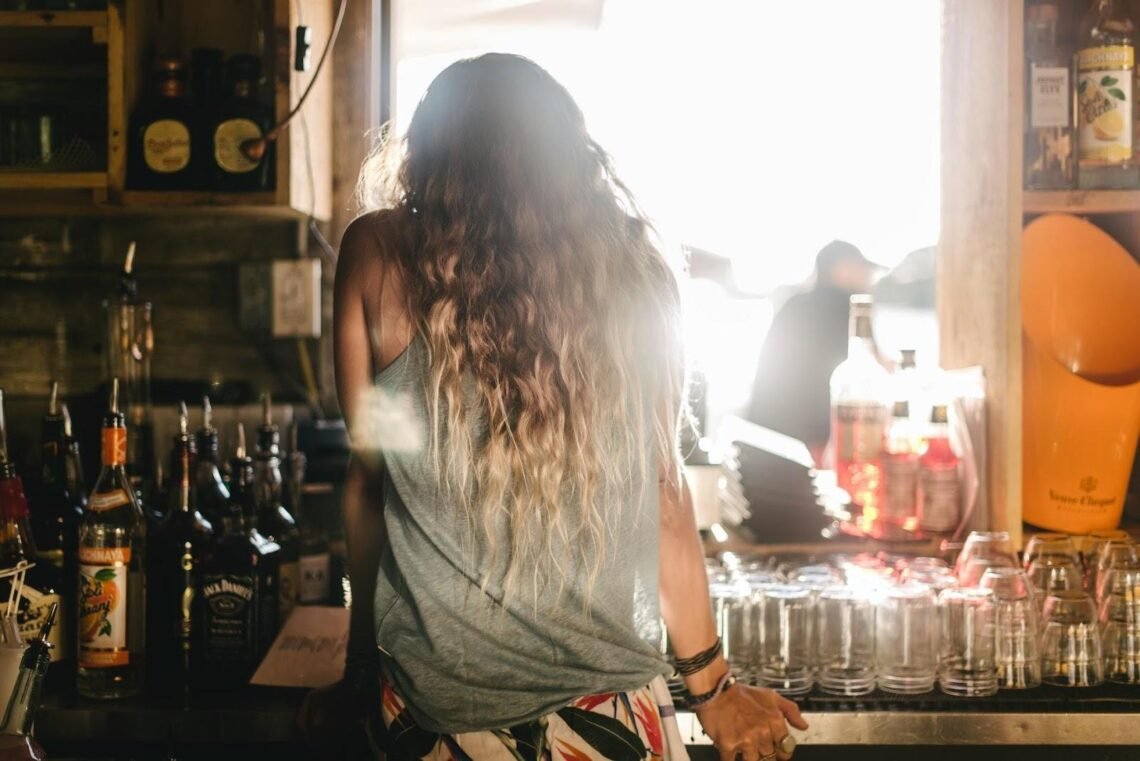Country of Origin: United Kingdom
Working in a pub encourages drinking.
For some, this is a dream.
For others, a nightmare.
After work, drinks, generous customers, access to stock, meetings in pubs, beer festivals, wine and spirit tasting, line-cleaning sessions, and being surrounded by alcohol all day, working in a pub leads to a lot of drinking.
And that’s part of why I was drawn to working in the industry. But with an already-developed alcohol problem stemming from my teens, I found that working in a pub fueled this at an extreme rate.
Today, the sober-curious movement has introduced a wide array of alcohol-free alternatives in pubs for the customer. But there is still very little being done by pub companies and breweries to safeguard their staff. A 2021 study by BMC Public Health exposes a significant ratio of heavy drinkers as publicans and managers of licensed premises.
Certainly, this industry would benefit most from prevention programs.
Early exposure
I had a fairly idyllic 1980s childhood in Yatton, a village in the south west of England, with casual kickabouts and cricket. But I often had a pang of sadness in me. I was quiet as a child and never shared how I felt, which led to feelings of disconnection and loneliness.
At 12, I started experimenting with alcohol and instantly fell in love with how it made me feel: instant liberation. It released me from the feeling of being trapped within myself. My teenage years were all about where the next party was and how we were getting our booze. I couldn’t get enough and quickly gained a hedonistic reputation. But on each occasion, I got carried away and passed out — always being told what I did or what was done to me the next day.
By the time I was fifteen, I was depressed. In the nineties, no one spoke about mental health, and I couldn’t understand what was happening to me. Alcohol allowed me to escape the depression — at least, initially. By seventeen, I was drinking alone and was at crisis point. Struggling secretly, I planned my first suicide attempt. Somehow, I fought my way through and completed my A-Levels, never telling anyone what I was going through, just knowing that qualifications were my opportunity to escape.
The drinker’s double life
At eighteen I moved to London to attend university. I found a house-share with six others in a large property in Stratford, East London. After a few months of drinking and hangovers, I stopped attending school. I found a bar job; I loved it.

I made friends, worked hard, partied hard. It didn’t take long for this pattern to get out of control; regularly, waking up somewhere I had no idea of. Mighty hangover fog, I’d make it through the day at work and finally finish with “a few” pints again. Being surrounded by alcohol normalized daily drinking. I thought it’s what everyone did at my age.
This lifestyle came with its dangers, though. Over 10 years, I was raped multiple times and in countless situations I didn’t know what I was doing or who I was doing it with. I felt utterly trapped in a cycle of self-hatred and attempts to alleviate the shame with more alcohol.
Management and misuse
I ran my first pub when I was twenty-five.
Working for a large London brewery, I climbed from bar server to general manager. I learnt about profit and loss, licensing and legislation, stock control, recruitment, training and disciplinaries, kitchen hygiene and cellar work. But never about responsible drinking, managing stress and mental health or interventions for staff who may develop drinking problems. The pub was trading well and I was making good bonuses. After paying rent and bills, I still had a significant disposable income to spend on more booze. Friends and family could always rely on me to be up for a drink and a good time. Life was all about enjoyment. I thought alcohol was the only way to achieve this, the spirit of the lifestyle.
But, hidden to many, I was struggling with severe depression and was drinking daily to deal with it. Always waking up in a different place with no reminiscence of the previous night became a shame too painful to acknowledge, I would do my best to push the feelings down and put on a smile. Alcohol made it easier. However, this progressively detached me from any emotions at all, and my true self sank away.

Soon, all I knew was that the shiny exhibited version of me — the side my customers saw — had no idea who I was, or what I liked. I was suffocating, it became impossible to keep the smile on. Desperate to escape the exhausting cycle of pretense and remorse, I became suicidal again.
Attempting to get a grip on my drinking, I often promised myself that I wouldn’t drink. But, after spending hours pouring pints, by the time I’d get to the end of my shift, I would have a few “in the till” from customers, or just pour from the large stock of surplus beer. Propped up at the end of the bar and chatting with my staff and customers, who were all of a similar age and who I considered my friends, it felt completely normal to round off my evenings this way. Of course, as an alcoholic, I ended up imbibing/consuming several drinks, before stumbling home.
Friday nights were line-cleaning nights. After we’d closed and cleaned up, three pints from each lager and cider tap were poured into jugs for us to drink before the line-cleaning chemicals came through. It was quite a skill to stop it just in time. This was very often the start of drinking until dawn.

A few months into my role, I was given the additional title of Ale Champion, the only manager in the area enthusiastic about cask ale. This role allowed me once every month out of my pub to taste and learn even more about beer at beer festivals or at the brewery. I was literally being paid to drink.
The next few years saw a few mental health crises and leaving jobs to escape my increasingly intolerable headspace — twice leaving the UK to escape. I kept running until I was thirty-five.
Eventually, though, I gave up pub work and finally gave up drinking. I’m now six years sober. Working in pubs did not make me an alcoholic, and my experiences are extreme. It did, however, enable my alcoholism. In April this year, I contacted 11 of the biggest UK pub companies to enquire whether there were any policies in place for safeguarding staff, and whether they had any interventions planned for when drinking got out of control. Only two replied. Nicholsons sent me an alcohol responsibility policy, but this was for guests and for the sale of alcohol, not for staff. Marston’s told me their policies were internal and not for the general public. Their silence is staggering.

Since 2001, when I started my first bar job, there has been no improvement.
I recently met Dru from Club Soda, a small organization committed to helping people drink more mindfully and live better by promoting low and alcohol-free drinks, providing courses and workshops, and creating a community through alcohol-free events. Dru told me he is “continually disappointed” by the big pub companies, who are difficult to engage with. Many of them offer yoga days, vegan days, and promote well-being with their staff, but they go silent when the dangers of alcohol are mentioned. Obviously, it’s not good business sense to tell the world that your core product is harmful, but shouting about the good work you’re doing to safeguard your staff could be excellent PR. The good news, though, is that there is some movement among smaller companies.
Club Soda works with The Drinks Trust, a charity dedicated to the drinks and hospitality workforce. It offers a service for businesses that can’t provide an Employee Assistance Program due to the size of their company, and it is the smaller businesses that are most receptive to safeguarding their staff. Although, with only 120 people per year signing up for Club Soda’s courses, there is still a long way to go.
Alessandra, from The Drinks Trust, told me that in the year 2020, it had launched and established many services and resources to support the well-being of the hospitality industry through its Restore service, all completely free to use.
Our pub hospitality community is exposed to alcohol in a way that others are not. There is little evidence that exposure leads to more significant dependency, but as an industry, we are equally likely as individuals to rely on alcohol as any other.
For this reason, The Drinks Trust has partnered with Club Soda in the Mindful Drinking Movement. Club Soda works closely with drinks brands and the hospitality sector helping thousands of people to change their relationship with alcohol.
The team at Bristol Beer Factory are also doing great things. Tom Clermont, Head of Sales, says they invest more time and money into promoting Clear Head, their 0.5% IPA (India Pale Ale) than any other product. The beer was brewed with their primary charity partner, Talk Club, a Bristol-based Mental Fitness Charity for men. Five percent of every bottle or pint sold goes directly to keeping Talk Club sustainable through regular cash donations, to keep building a community of positivity and mental fitness. They also invest in their managers by enrolling them in mental health training, and they are on their way to achieving B-Corp status, a certification of proven excellence taking in staff happiness and policies, environmental impact, charitable giving, and community engagement.
Unfortunately, the wine industry is still a little sniffy about alcohol-free alternatives, instead of adopting the mantra, “drink less, drink better.” A cynical mind could view this as an upselling technique. However, Liberty Wines, a wine wholesaler and importer based in London, has been working with Club Soda on an in-house workshop, “Discover Mindful Drinking”, to promote a mindful drinking culture within the company.
I don’t blame the pub industry for my alcoholism, so well-developed on my own. But it’s been a reflection that perhaps pub companies will take some responsibility for their employees. Companies and organizations like Club Soda, The Drinks Trust, and Bristol Beer Factory are paving the way for culture change. The next steps are to put company policies in place for prevention and processes for alcohol responsibility and awareness among staff. In addition, interventions can be planned for when an employee’s alcohol intake tips from social to dependent drinking. Here’s hoping that one day, the big pub companies, who employ over 450,000 people in the UK, will follow and take some responsibility as well.
Mindful Drinking Movement-
https://www.countryandtownhouse.com/food-and-drink/mindful-drinking-movement/
BMC Public Health-
https://bmcpublichealth.biomedcentral.com/articles/10.1186/s12889-021-10208-x
Thank you to Yosef Baskin, Tripti Mund and Brooklyn Riepma for their inspired edits on this piece and everyone else on the Work & Life team.
If you are interested in submitting a piece to the DG Sentinel, please visit our submissions page here.











